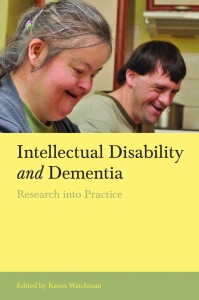Karen Watchman, Lecturer in Dementia at the Alzheimer Scotland Centre for Policy and Practice, and editor of the new book Intellectual Disability and Dementia, joined us for a short interview. She talks about how she became involved in the field, and gives her advice for those working with and supporting people with intellectual disabilities and dementia.
How did you get involved with this area of study?
I spent many years as Director of Down’s Syndrome Scotland where I worked alongside families and people with Down syndrome of all ages. There was even less research conducted about dementia in people with intellectual disabilities at that time which spurred me on to complete a Masters degree in Dementia followed by a PhD researching the experiences of people with Down syndrome and dementia. So, whilst I have an academic interest in this area I am very much grounded in practice and in ensuring that information is made available in an accessible format.
My Great Aunt had Down syndrome and, unusually for the period in which she grew up, lived at home with family into her adult years. So it came as no surprise when research started showing the link between quality of life and increased life expectancy.
People with disabilities are living for longer and as a result we are seeing more people with intellectual disabilities than ever develop dementia as they age. What training is available for carers and professionals to help deal with this increase?
Typically in the UK, staff, volunteers and carers supporting people with an intellectual disability do not have training in dementia. Similarly, staff supporting older people with dementia do not have training in intellectual disabilities, despite many younger people (especially with Down syndrome) being diagnosed, and some moved inappropriately to care homes for older people.
This is slowly starting to change but there is still not enough interdisciplinary exchange of learning. Training and courses that I deliver where staff attend from across sectors are very valuable, as participants learn from each other. However, it is not just intellectual disability or dementia services – equally important, especially as dementia progresses, is the input of all allied health and palliative professions and that there is partnership working with all services talking to each other and to carers, and all being consistent in their approach.
Are they any particular methods or activities which are helpful in explaining a dementia diagnosis to someone with an intellectual disability?
This is an area addressed in the book and is something that doesn’t receive enough attention currently. As a result there is inconsistency in practice. Information about a diagnosis or suspected diagnosis of dementia is not routinely shared with the person who has an intellectual disability, despite UK dementia strategies maintaining that everyone has a right to know of their diagnosis. We need to think more about how this can be done with people who have an intellectual disability and embrace non-verbal communication methods too.
What should staff or carers be aware of in order to be able to support people with an intellectual disability and dementia?
Someone who already works alongside people with an intellectual disability is likely to have been trained to support people to maximise their independence, to work towards independent living or community involvement to the best of their ability. Their work will be person centred and will be focused on the needs of each individual. There is an element or re-learning required by staff when the person with an intellectual disability has a diagnosis of dementia. The work should still be person centred and based around the individual but as capacity and cognitive ability change there is an associated need to change the way that staff, volunteers, family and friends provide support.
Carers also need information about interventions – this may or may not include medication. Social interventions such as meaningful activities and life story work are also essential. Awareness of contraindications with medication is important especially as many people with intellectual disabilities are over-prescribed anti-psychotic medication.
Specific knowledge of dementia that needs to be shared with staff, volunteers, family and friends include: what dementia is, different types of dementia and how each affects the person, early signs (this can differ from early signs in older people without an intellectual disability), environmental adaptation to ensure that accommodation is appropriate to the persons changing needs, communication changes and physical changes that will occur as the condition progresses. I am often asked for help with what is perceived as a behavioural issue, but with appropriate information or training there is a realisation that if we get the environment, communicating and our approach right – this is what has caused the changes in behaviour. We need to work out the triggers and acknowledge our role in this – often a change in behaviour is caused by us not understanding the person and not providing appropriate support.
Intellectual Disability and Dementia is due to be published May 2014.
Karen Watchman is the editor of the book as well as an experienced expert in working with intellectual disabilities.